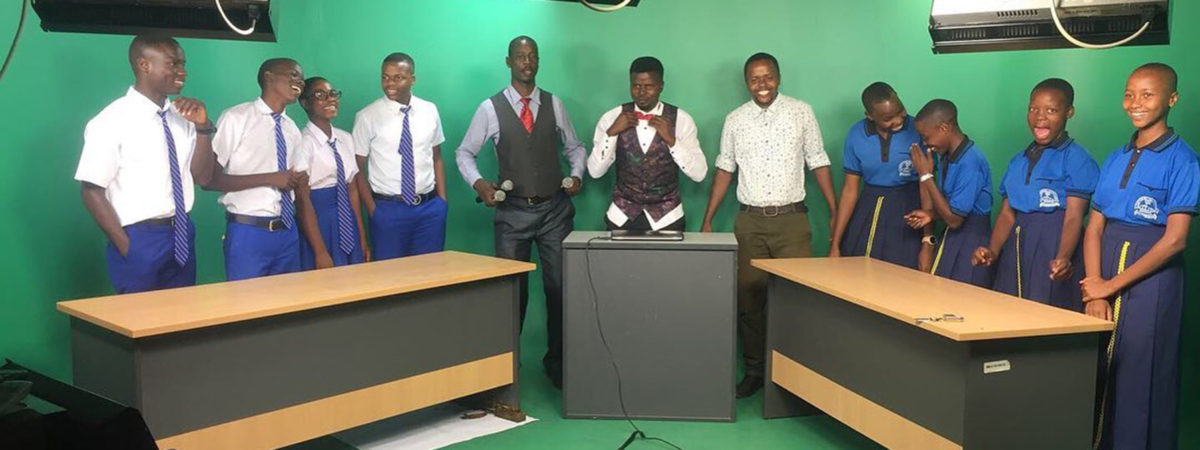
In honor of International Day of Education, we spoke with educators whose student teams received a Sustainability Award in the first round of the Ciena Solutions Challenge, a global design challenge inviting students and teachers to use Challenge Based Learning to address real problems and take action to build a better world. From a global warming awareness campaign in San Jose, California, to a sustainable refrigeration prototype in Lagos, Nigeria, these projects represent action concepts and solutions from young people from around the world.
Learn how the educators and student teams have centered learners as they scaled participation, built community partnerships, and promoted advocacy to advance their Ciena Solutions Challenge projects in the last year:
Let your students guide you in the journey. Use the idea that students have the power and the stories to tell themselves and to better their community in creative ways that allow them to express themselves. – Will Cavada, educator, San Jose, California
For Will Cavada, a multimedia arts teacher at Mt. Pleasant High School in San Jose, California, podcasting has been a powerful tool for students to express themselves and strengthen their connections to their community. “Whether they’re sharing their thoughts on a current event, discussing an academic pursuit, or simply sharing their personal stories, they can use podcasts as a platform to share their unique voice and viewpoint with others.” With funding from a Ciena Solutions Challenge Sustainability Award for the Overcome CO2 project, the team purchased audio equipment to promote their message and make the opportunity available to more students. They recently launched a podcast on Spotify covering topics from climate change to the Black Lives Matter movement, to the vibrant history and culture of lowrider car culture in their community.
For Ivanete Paes Landim, an English language teacher at EE Simpliciano Campolim de Almeida and EMEF Dr Humberto de Morais Vasconcelos in Nova Campina, Brazil, putting students at the center is also a foundational philosophy. As she describes, “Our challenge with the Seeds for the Future project is to make students the protagonists of their own learning journey, researchers, and sowers of ideas for their peers and for the entire community.” Since launching their project, her team has invested award funding in equipment and resources to enable students to leverage technology and robotics to design sustainable house and vertical garden prototypes, most recently expanding their focus into sustainable tourism in partnership with the city’s Department of Tourism and Culture.
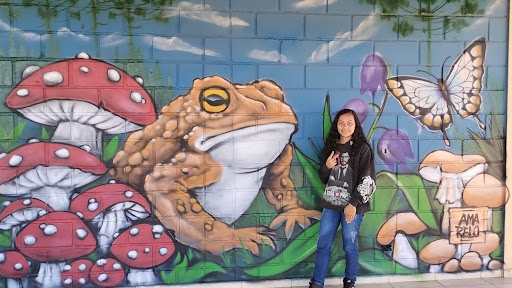
Students promoting Ecotourism in Action – Beyond the School Walls as part of the Seeds for the Future Project in Nova Campina, Brazil.
Make partnerships with other schools and other stakeholders to establish real world learning opportunities for students. -Theode Niyirinda, educator, Kampala, Uganda
In each community educators spoke of the wealth of experience and knowledge that resides with community members, and the value of bringing the community into the classroom as well as taking students into the world to understand the relevance of what they are learning.
Since receiving a Ciena Solutions Challenge Sustainability Award, students at Gayaza High School in Kampala, Uganda, have expanded their campaign to address plastic waste and the gradual disappearance of trees. Their projects “Don’t Be Drastic, Say No to Plastic,” and “Plant a Tree, Plant a Future,” even led to an invitation to speak on live national television. For their educator, Theode Niyirinda, these types of opportunities for students to document and communicate about their actions with the wider community, including peers at other schools, is at the core of his teaching. He encourages other educators to actively explore how partnerships with other schools and stakeholders can establish real world learning opportunities for students.
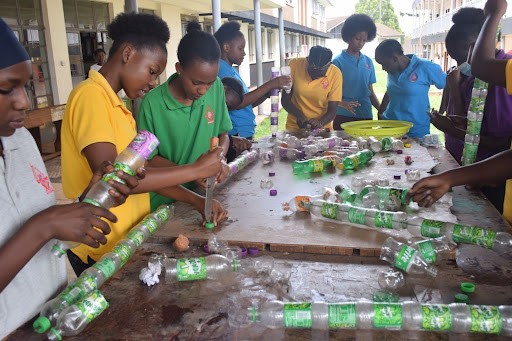
Gayaza High School ‘Don’t Be Drastic, Say No to Plastic’ team members.
For Mahamba Sebastian, president of the English Language Teacher Association in Mwanza, Tanzania, the U.S. Embassy in Tanzania was an ideal partner for providing students a space to record segments of their IQ Interschool Challenge TV Program and receive additional coaching for their pre- and post-production activities.
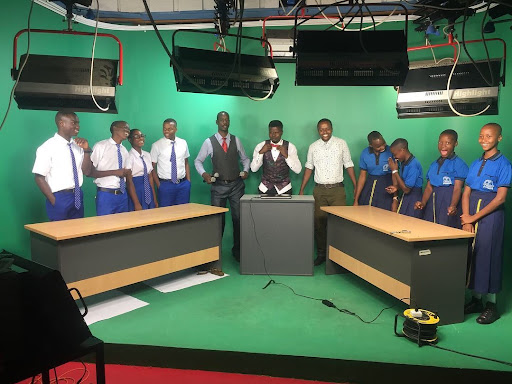
Production time for the IQ Interschool Challenge TV Program in Tanzania.
For Jobert Ngwenya’s students at Eveline High School in Bulawayo, Zimbabwe, the Midlands State University Food Science Laboratory supported them with testing the nutritional benefits of their Mystery Munch Nutrition Bar. After receiving positive feedback at events like the Zimbabwe International Trade Fair and showcasing Mystery Munch to various health stakeholders including local authorities, national policy makers, and food entrepreneurs, the team is currently pursuing registration of their company with the national deeds office in order to patent their idea and scale it up through formal partnerships with the business community.
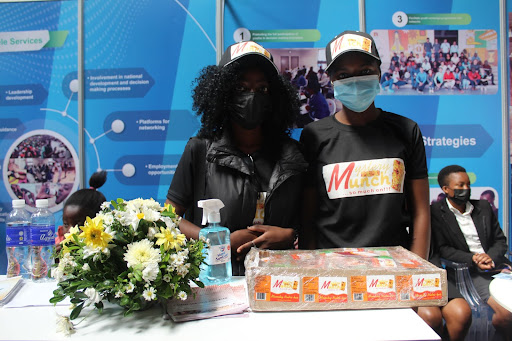
Mystery Munch students present at the Zimbabwe International Trade Fair.
We may not be able to change the world, but we can take actions that will impact the world positively one class at a time.” – Samuel Awoyemi Olaoluwa, educator, Lagos, Nigeria
Across all these Ciena Solutions Challenge projects, educators spoke of the motivation students get when they see the value and relevance of the work they are doing in the form of real contributions they can make to their own communities.
For Samuel Awoyemi Olaoluwa, a chemistry teacher at Caleb British International School (CBIS) in Lagos, Nigeria, teaching with a civic action focus prepares students to “use scientific principles and processes in making personal decisions and to participate in discussions of scientific issues that affect society.” Concerned about climate change and the high temperatures and flooding their community has faced in recent years, Olaoluwa’s students designed STEM Farm, a hydroponic organic farming system using locally sourced cheap raw materials as replacements for soil.
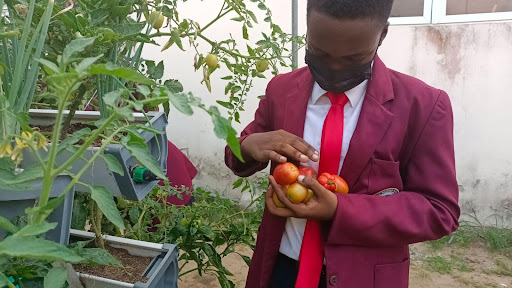
Students in Nigeria harvest tomatoes from their STEM Farm project.
After receiving the Sustainability Award, the team started a new project focused on reforestation in their local community. They planted over 50 trees and mitigated more than 250 kilograms of carbon dioxide. They plan to continue with their reforestation project and their broader campaign to help people in their community embrace climate-smart agriculture.
For Grace Nabuduwa, principal and head teacher at Ngora Girls Secondary School in Teso Region, Uganda, their projects, Ngora Greening Campaign, Together Against Teen Pregnancy, and Youth Drug Abuse Prevention Campaign were “an experience in which students set the tone and direction of learning that was experiential and also meaningful and relevant to them and the community.” They’ve continued to expand their activities, and in November, they took to the air on the Aisa 92.3 FM radio station to discuss their climate action work as part of COP 27 activities.
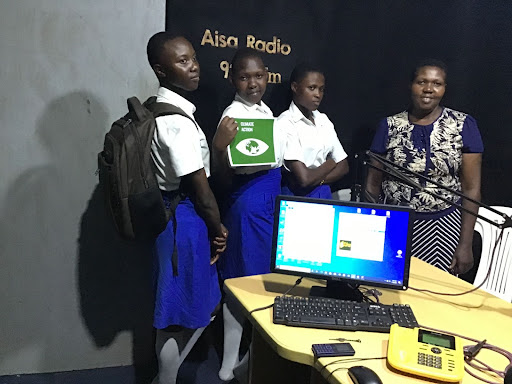
Students from Ngora Girls Secondary School at Aisa Radio Station in Uganda.